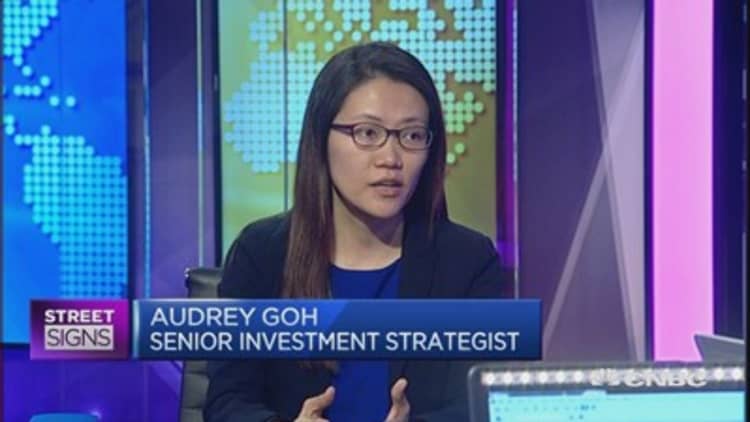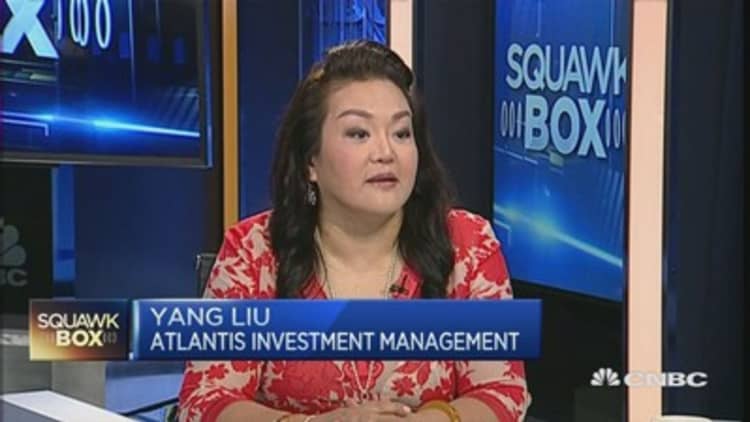A dramatic correction, along with frequent bouts of extreme volatility over the past few months, are getting analysts increasingly concerned about the fragile state of China's stock markets.
The ended Tuesday up 2.2 percent at 4,575.12, not before slumping to a more than three-week trough of 4,264.77 intra-day.
The wild move came on the back of a 13.3 percent tumble last week, the benchmark index's sharpest weekly drop since the global financial crisis. Analysts largely attribute the dramatic plunge to a raft of initial public offerings (IPOs) that locked up an estimated 6.7 trillion ($1.1 trillion) worth of funds, as well as regulatory efforts to rein in excessive levels of leverage.
Meanwhile, worries about margin trading are bubbling up again, with some analysts warning that a sudden shift in sentiment among margin traders could put the brakes on the country's largely blistering rally. Restrictions on the amount of borrowed cash that can be used to buy stocks have previously sparked some of this year's biggest declines, including a 6.5 percent slump in Shanghai on May 28.
Hence, the drop in leveraged positions in the same market last Friday raised a red flag for IG's market strategist Evan Lucas. The outstanding amount of margin debt on the Shanghai Stock Exchange dropped to 1.479 trillion yuan, from a record 1.483 trillion yuan on Thursday. This marked the first decline in margin positions since May 22.
Read MoreForget Greece-time to worry about China: Insana
Given that there is approximately $365 billion of borrowed money in the markets of Shanghai and Shenzhen, IG's Lucas noted that a pullback on those positions could "trigger violent price action, stop losses and see disorderly selling."
According to Lucas, stocks that were long favored by Chinese margin traders outpaced the broader index's slump to fall into bear market territory last week. The biggest losers included solar-equipment manufacturer EGing Photovoltaic Tech Company and Shanghai Construction Group, which plummeted 21 and 19 percent respectively from June 15-19. Both Shanghai-listed companies had margin trade ratios of about 44 and 34 percent, respectively.
"Margin (when correctly used) is a useful and profitable investment tool but if everyone uses it together, a crowded trade becomes a bloated trade fast," Melbourne-based Lucas added.
However, CMC Markets' Nicholas Teo doesn't think this is a cause for worry, just yet.
"China's market is huge. A 20 percent drawdown in a few stocks can lead to a snowball effect only if this move involves an entire sector but so far, this isn't the case," the Singapore-based market analyst told CNBC by phone.

Insider selling
Meanwhile, insiders such as senior management and controlling shareholders of companies, may also hold sway over the rout in mainland stocks, according to a note released by HSBC on Tuesday.
This is due to a pick-up in pace in net insider selling, which hit 145 billion yuan in May and 100 billion yuan in the first three weeks of June, the HSBC report said. For the first half of 2015, total net insider selling totaled 460 billion yuan, translating into an average of 80 billion yuan per month.
According to HSBC, this figure is well above the monthly average of 10 billion yuan from the year-ago period.
This acceleration in selling may send a negative signal to retail and institutional investors and if it continues, China's stock market could see further rough weather ahead, said IG's market strategist Bernard Aw.

Risk-off? Not yet
To be sure, there are analysts who remain sanguine on the market's outlook, like Standard Chartered's senior investment strategist Audrey Goh , who told CNBC's "Street Signs Asia" that the ongoing technical correction is "healthy for the market in the long run following a nearly vertical rise."
Meanwhile, other market watchers are betting the People's Bank of China (PBOC) will step on the monetary pedal soon, providing another catalyst for further gains.
For Atlantis Investment Management, the sharp market downturn is an opportunity for investors to increase their holdings.
"The whole market valuation is about 30x, but if you look at the blue chips, they are only at 15x so valuations are still reasonable," chairman & CIO of the fund manager, Yang Liu, said in an interview on "Asia Squawk Box" Tuesday. "If you look at the big picture, there is no reason not for the Shanghai Composite to go higher but before that we need to lay down the foundations... the correction is just part of a new normal."

